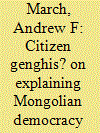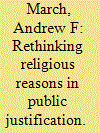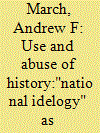| Srl | Item |
| 1 |
ID:
065677


|
|
|
| 2 |
ID:
127804


|
|
|
|
|
| Publication |
2013.
|
| Summary/Abstract |
This article intervenes in the debate on the place of religious arguments in public reason. I advance the debate not by asking whether something called "religious reasons" ought to be invoked in the justification of coercive laws, but by creating a typology of (a) different kinds and forms of religious arguments and, more importantly, (b) different areas of political and social life which coercive laws regulate or about which human political communities deliberate. Religious arguments are of many different kinds, are offered to others in a variety of ways, and the spheres of life about which communities deliberate pose distinct moral questions. Turning back to the public reason debate, I argue then that political liberals ought to be concerned primarily about the invocation of a certain subset of religious reasons in a certain subset of areas of human activity, but also that inclusivist arguments on behalf of religious contributions to public deliberation fail to justify the use of religious arguments in all areas of public deliberation.
|
|
|
|
|
|
|
|
|
|
|
|
|
|
|
|
| 3 |
ID:
113829


|
|
|
|
|
| Publication |
2012.
|
| Summary/Abstract |
Some scholars have argued that religiously injurious speech poses a serious problem for secular liberal thought. It has been suggested that secular liberal thought and political practice often misrecognize the nature of the injury involved in speech that violates the sacred and that much secular thought about religious injury (and free exercise more generally) is premised on unacknowledged Protestant conceptions of what real religion is. In this essay, I argue against the ideas that secular liberalism tends to treat religion only as a matter of freely chosen belief and that the unchosen, habituated nature of much religious experience raises a problem for the defense of speech that violates the sacred. I argue that secular thought and practice should remain very concerned about the social and political harms of speech directed unambiguously at social groups but need not eliminate the gap between religious attachments and religious persons.
|
|
|
|
|
|
|
|
|
|
|
|
|
|
|
|
| 4 |
ID:
099297


|
|
|
|
|
| Publication |
2010.
|
| Summary/Abstract |
This article presents an interpretation of Sayyid Qutb's political theory based on a prominent feature of his thought: the claim that Islamic law and human nature (fitra) are in perfect harmony, and that the demands of Islamic law are easy and painless for ordinary human moral capacities. I argue that Qutb is not only defending Islamic law as true and obligatory, but also as a coherent "realistic utopia"-a normative theory that also contains a psychological account of that theory's feasibility. Qutb's well-known fascination with the earliest generation of Muslims (the salaf) is an integral part of this account that serves two functions: (1) as a model of the feasibility and realism of an ideal Islamic political order, and (2) as a genealogy of the political origins of moral vice in society. Qutb's project is thus an account of exactly why and how Islam requires politics, and how modern humans can be both free and governed.
|
|
|
|
|
|
|
|
|
|
|
|
|
|
|
|
| 5 |
ID:
023564


|
|
|
|
|
| Publication |
Dec 2002.
|
| Description |
371-384
|
|
|
|
|
|
|
|
|
|
|
|
|
|
|
|